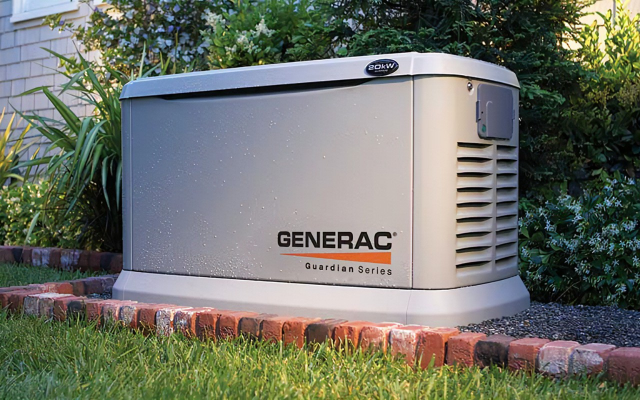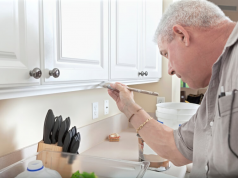What would the capacity of a 10000-watt generator be? Many other power generators are available, but a 10000-watt generator can serve your needs. Our team reviewed dozens of 10000-watt generators and filtered the five best generators. We have compiled this list based on pricing, guarantee, noise level, energy output, warmth control, and oil protection.
Best 10000-watt generator
1. Generac Guardian Wi-Fi Equipped Standby Generator
Generac is known for producing high-quality generators, and the Guardian Wi-Fi-equipped standby generator is another excellent example. Wi-Fi connectivity is a significant benefit, as is the standard automatic transfer switch. It uses more gasoline than the other 10,000-watt generators we looked at, but that shouldn’t deter you from buying it.
Pros
- Mobile Link permits remote monitoring.
- Digital voltage regulation that is automatic
- Self-test for lower RPMs
Cons
- Installing it can be tough.
- Battery not included because of higher fuel consumption
2. Kohler 10RESV 120/240V1ph Generator
The Kohler 10RESV model is the cheapest of the 10,000-watt generators we tested, and it comes with the Kohler name’s strong reputation.
Its steel housing provides enhanced corrosion protection, which helps keep the unit safe in icy environments. There aren’t many drawbacks to this generator, but it does require the purchase of an automatic transfer switch, and users have expressed concerns about the guarantee not covering their repairs.
Pros
- Price
- Remote surveillance
- It is possible to install it as close as 18 inches from a house.
Cons
- There is no automatic transfer switch incorporated.
- Conditions of the warranty
3. Briggs & Stratton 10kW Standby Generator
Remote monitoring and lower fuel consumption are among the benefits of the Briggs & Stratton 10kW backup generator. The model’s 20-second response time is one of its best features. Because power outages often last only a few seconds, a 20-second wait period can lower the frequency with which the generator fires up.
An automated transfer switch, like other generators, is supplied separately, and if you live in a cold climate, a cold-weather kit will help protect the generator.
Pros
- Low usage of fuel
- 20-second response time for remote monitoring
Cons
- There is no automatic transfer switch incorporated.
- Housing design is difficult.
- For frigid climates, a cold-weather kit is required.
4. Honeywell 10kW Air Cooled Home Standby Generator
The Honeywell 10kW air-cooled home standby generator has the lowest fuel consumption and noise level of the generators we tested, but it also has the most expensive price tag.
A Generac engine powers the Honeywell generator, so why not get a Generac generator instead? A Honeywell generator must be purchased from an authorized Honeywell dealer, which can be difficult to locate.
Pros
- Monitoring of Mobile Links
- Low usage of fuel
- The noise level is low.
Cons
- Many competitors’ prices are higher.
- Generac’s G-Force Engine is used.
- A Honeywell dealer is required for purchase.
5. Briggs & Stratton 12,000 Watt Automatic Air-Cooled Standby Generator
Although Briggs & Stratton no longer makes a 10,000-watt automated air-cooled standby generator, it does make an excellent 12,000-watt generator.
Because it is a larger generator, it will be a little louder and use more fuel than other 10,000-watt generators. However, it offers a few extra features, such as the Simple Control System and a low run speed setting to save fuel. The generator can also be controlled via an app, and it comes with one of the best warranties available.
Pros
- App for managing backup generators
- Ability to run at low speeds
- A five-year warranty covers parts, labor, and travel.
Cons
- Increased fuel usage
- Wi-Fi monitoring requires a subscription.
- For frigid climates, a cold-weather kit is required.
How to Determine Which 10,000 Watt Generator Is Best for You
An automatic transfer switch distributes electricity from a generator to a dwelling when a power outage is detected. Rather than an automatic one, a manual transfer switch may need you to step outdoors during a storm to turn on the generator.
Warranty
A warranty should not be the only consideration to consider when purchasing a generator, and it can help you choose one model over another. Four of the generators on our list include a five-year limited warranty, which provides additional protection if the generator fails.
Consumption of fuel
It may not seem important how much gasoline your generator consumes when in use during a power outage, but when the bill arrives, you may reconsider. Before you buy a generator, check the fuel consumption figures to better understand what you’ll be getting. Generators are normally operated once a week for maintenance, so your heating bill will increase.
Noise Level Generators may be quite noisy, so paying attention to the noise level before purchasing one could save you a lot of grief later. The decibel levels of the generators we looked at ranged from 57 to 74 dbA.
The Benefits of Purchasing a 10,000 Watt Generator
Power without interruption
A backup generator is an excellent safeguard if your home has medical gadgets that require constant electricity. A standby generator will safeguard a home’s electronics and prevent data loss in the event of a power outage. Plus, knowing there’s a generator on hand to keep the lights on in a power loss gives you peace of mind.
Value
You might not be able to do laundry and power everything else in your house with a 10,000-watt generator, but laundry is probably the last thing on your mind during a power outage.
Generators with a 10,000-watt capacity are also a wise investment for homeowners. For the 10,000-watt generators, we looked at a cost between $2,900 and $4,100, which is significantly less than larger generators.
Locale
If you live in a rural area or in a place where power outages occur frequently, a generator can be a good purchase. Rural areas may take longer to restore electricity than other areas, and areas hit by hurricanes or tornadoes may be without power for days, so having a backup plan is a smart idea.
How to Use 10,000 Watt Generators Safely
Safe Networking
It is critical to connecting your generator correctly. An incorrectly connected generator poses several dangers, including carbon monoxide poisoning from the engine exhaust, electrocution, and fire.
The first step in making safe connections with your generator is to ensure it’s the right size for your electrician’s needs. After that, you need to hire a certified, professional electrician to connect your 10,000-watt generator.
Hazardous Release
Carbon monoxide is produced in large quantities by generators. As a result, a generator should never be used indoors. Additionally, be sure that the exhaust pipe from your generator is pointed away from your house.
Fueling
When it’s time to refuel the generator, make sure it’s completely cool first, and store the gasoline somewhere cool and dry out of the sun.
If the muffler on your 10,000-watt generator heats up, be careful when using it and make sure the fuel supply is properly maintained. It’s normally preferable to apply a fuel stabilizer in this circumstance to assist slow down the chemical degradation of the fuel.
Methodology
Our Home Improvement editorial team reviewed third-party data on 16 major brands to find the top 10,000-watt generator, with each product’s star rating determined by a variety of parameters, including
- Price (30%)
- Warranty (30%)
- Noise Level (30%) (15 percent)
- Energy Production (15 percent)
- Temperature Control (5 percent)
- Oil Resistance (5 percent)
Frequently Asked Questions (FAQs)
Why is a 10,000-watt generator necessary?
A 10,000-watt generator will power most goods in a home during a power outage and provides a safety net for individuals who rely on their devices to operate without interruption. A 10,000-watt generator is also a fantastic entry-level generator for first-time generator customers who want everything they desire in a generator at a low price.
Is it cheaper to use propane or gas to power a generator?
Propane is more expensive than natural gas, but it is more efficient. In some areas, natural gas may be more convenient than propane.
Are our backup generators a good investment?
If you reside in an area where weather-related power outages can leave you without power for more than a few hours, standby generators are a good investment. People who rely on oxygen or have other medical issues that necessitate the use of electronics can benefit from having a backup generator.
What size generator do I require?
To figure out what size generator you’ll need, add up the power requirements of all the items you intend to run simultaneously in your home. The user handbook is the greatest resource for determining an appliance’s actual wattage. Add the wattages of each appliance together to determine your overall wattage requirements. It’s better to use a generator that can easily meet all your power requirements while only using about 90% of its capacity.















